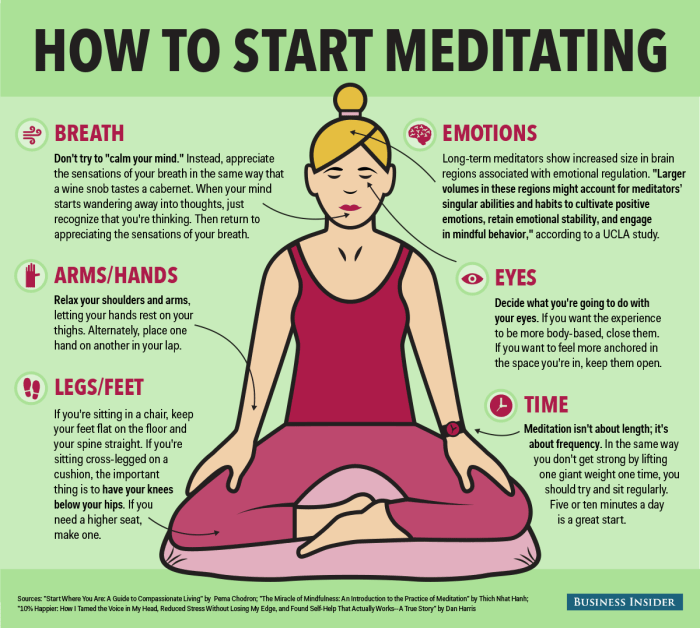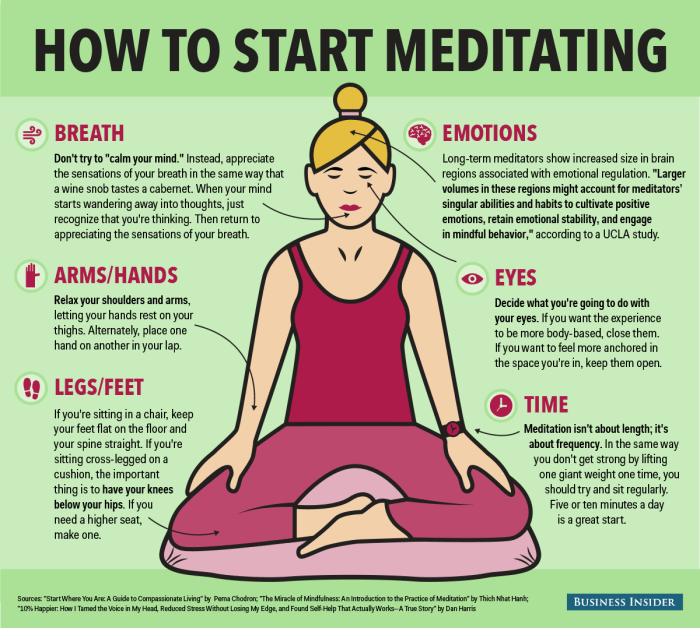Meditation for Beginners takes center stage, inviting you to explore the world of mindfulness and tranquility. Get ready to embark on a transformative journey towards inner peace and self-discovery.
Discover the mental and physical benefits, explore different meditation types, and gain practical tips to kickstart your meditation practice. Let’s dive in!
Benefits of Meditation for Beginners
Meditation offers a wide range of benefits for beginners looking to improve their overall well-being. From mental health benefits to physical advantages, incorporating meditation into your daily routine can have a profound impact on your life.
Mental Health Benefits
- Reduces stress and anxiety levels by promoting relaxation and calmness.
- Improves focus and concentration, leading to enhanced productivity and mental clarity.
- Helps manage symptoms of depression by fostering a sense of inner peace and emotional stability.
Physical Health Benefits
- Lowers blood pressure and reduces the risk of heart disease.
- Boosts the immune system, making the body more resilient to illnesses.
- Improves sleep quality and aids in better overall physical health.
Types of Meditation for Beginners

When it comes to meditation, there are various types that beginners can explore to find what works best for them. Each type offers unique techniques and benefits to help individuals achieve a sense of calm and focus in their practice.
Mindfulness Meditation
Mindfulness meditation involves focusing on the present moment without judgment. Practitioners pay attention to their thoughts, emotions, and sensations without getting caught up in them. This type of meditation helps increase self-awareness and reduce stress.
Loving-kindness Meditation
Loving-kindness meditation, also known as Metta meditation, involves cultivating feelings of love, compassion, and kindness towards oneself and others. This practice can help improve relationships, enhance empathy, and promote emotional well-being.
Guided Meditation vs. Silent Meditation
Guided meditation involves following instructions from a teacher, audio recording, or app to lead you through the meditation practice. This can be helpful for beginners who may find it challenging to meditate on their own. On the other hand, silent meditation involves sitting quietly and focusing on your breath or a mantra without external guidance. Both types have their benefits, and individuals can choose based on their preferences and comfort level.
Choosing the Right Type of Meditation
For beginners, it’s essential to explore different types of meditation to see what resonates with them. It’s okay to try out various techniques and see which one feels most comfortable and effective. Factors to consider when choosing the right type of meditation include personal goals, preferences, and lifestyle. Remember, there is no one-size-fits-all approach, so feel free to experiment and find what works best for you.
Tips for Starting a Meditation Practice: Meditation For Beginners

Starting a meditation practice can be a transformative journey towards inner peace and mindfulness. Here are some practical tips to help beginners get started:
Creating a Peaceful Meditation Space at Home
Setting up a dedicated meditation space in your home can help create a peaceful environment for your practice. Choose a quiet and clutter-free area where you feel comfortable and relaxed. Decorate the space with items that promote tranquility, such as candles, cushions, or plants. Make sure the space is free from distractions like electronic devices or loud noises.
Best Time of Day to Meditate for Beginners
The best time to meditate is when you can be consistent with your practice. For beginners, early morning or evening before bed are often recommended times to meditate. Choose a time when you are less likely to be interrupted and can fully focus on your practice. Experiment with different times to see what works best for you.
How to Focus and Quiet the Mind During Meditation Sessions
One of the biggest challenges for beginners is quieting the mind during meditation. To help focus and calm your mind, start by taking deep breaths and bringing your attention to the present moment. You can also use techniques like focusing on your breath, repeating a mantra, or visualizing a peaceful place. Remember that it’s normal for thoughts to come and go – simply acknowledge them and gently bring your focus back to your meditation practice.
Common Challenges Faced by Beginners
Starting a meditation practice can be challenging for beginners, as it requires focus and discipline. Here are some common obstacles beginners may encounter and how to overcome them:
Distractions During Meditation
- Acknowledge distractions without judgment and gently bring your focus back to your breath or mantra.
- Try meditating in a quiet space or using earplugs to minimize external distractions.
- Consider using guided meditation apps or recordings to help maintain focus.
Restlessness or Impatience
- Practice patience and understand that meditation is a skill that takes time to develop.
- Focus on your breath and use it as an anchor when feelings of restlessness arise.
- Start with shorter meditation sessions and gradually increase the duration as you build your practice.
Progressing in Meditation Practice
As beginners start to get comfortable with meditation, they can gradually increase the duration of their sessions to deepen their practice and experience more benefits. Consistency is key in making progress and reaping the long-term rewards of meditation.
Increasing Session Duration, Meditation for Beginners
Beginners can slowly extend their meditation sessions by adding a few minutes each day or week, depending on their comfort level. This gradual approach helps the mind and body adapt to longer periods of stillness and focus.
Deepening the Experience
- Try different meditation techniques to explore what resonates best with you and enhances your experience.
- Focus on your breath, body sensations, or a mantra to deepen your concentration and mindfulness during meditation.
- Set intentions or goals for your practice to cultivate specific qualities like gratitude, compassion, or inner peace.
- Experiment with meditating in different environments or at varying times of the day to find what works best for you.
Importance of Consistency
Consistency in meditation practice is crucial for achieving long-term benefits. Regularly committing to meditation helps train the mind, reduce stress, improve focus, and promote overall well-being. By making meditation a daily habit, beginners can experience transformative changes over time.